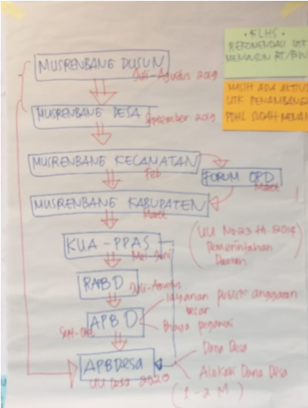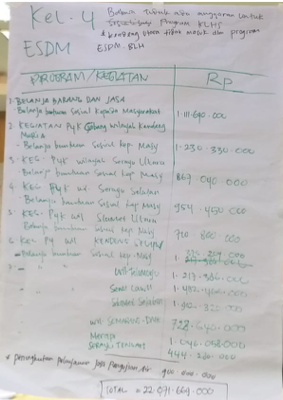For decades, Kendeng’s heroine have been involved in various activities to preserve Kendeng Mountain. Their aspiration has been voiced, including during the meeting with the government. However, women’s involvement still needs to be improved, especially in the aspect of development planning, so that they are significantly empowered. Moreover, Central Java Province is now in the crucial phase after the revision of the 2009-2029 Regional Spatial Planning (RTRW) and 2018-2023 Mid-term Development Plan.
For this reason, PWYP Indonesia with LBH Semarang conducted the “Training for Policy Advocacy and Kendeng Women Gathering”, attended by representatives from Pati, Grobogan, and Kendeng. Present as the facilitator is Tenti Novari Kurniawati, Executive Director of Perkumpulan Idea Yogyakarta, who is well-known for her work on gender and public policy participation.
In the beginning, participants were invited to reflect on how the division of roles between women and man in the domestic and public domains. Tutik, who works as a farmer, recounted the results of her small group discussion regarding the division of work between wife and husband, both at home and in the fields. “When in the fields, wife and husband work together, but when at home, women do more activities such as cooking and washing,” said Tutik.
While Deni from Grobogan, stressed a tendency on more equal division of labour between wives and husbands in the young families. In the domestic sphere, husbands help a lot with homework, and in the productive domain, men and women work together. However, in the public domain, man is highly more involved, especially in the decision-making process. Man also dominated citizen meeting forums.
Unsurprisingly, the decision resulted from development planning meeting (musrembang) is not gendered responsive. According to one of the participants who had participated in musrembang, the proposals were more on the infrastructure development. In fact, on the other hand, women have their own needs and aspirations.
Umi, one of the participants from Kendal/Demak who has participated in musrembang, said that in her village, women succeeded to propose the development of disabled friendly areas, as well as health services that were friendly to the victims of sexual violence. The community there also demanded the government to promote gender-friendly development.
Tenti shared the flow of planning and development process where women as a citizen could be involved. Musrembang starts in the sub-village level to village, sub-district, and district level. “As citizens, women have the right to be involved in the decision-making process, so that women’s aspirations are raised, and the program will accommodate women needs,” explained Tenti.
Tenti also explained the budget and development cycle, which occurred every year. Musrembang at sub-village level takes place in July-August, musrembang at village level takes place in September, then musrenbang at sub-district and district level take place in February and March respectively. While discussion on General Budget Policy and Priorities of Temporary Budget Ceiling held in May-June, and last, Discussion on the draft of Local Budget Plan and the Local Budget each takes place in July-August and in September-October.

“By knowing the time cycle, women groups can prepare and organise themselves to be involved in the development planning process,” added Tenti.
Besides understanding the development planning cycle, participants were also invited to understand and analyse the Local Budget of Central Java Province. In particular, participant analysed the community empowering and women empowerment budget, also budget for Energy and Mineral Resource Agency at the province.
“One of our findings is the absence of budget allocated to implement the Strategic Environmental Assessment program in the budget of Energy and Mineral Resource Agency. Also, North Kendeng is in fact not included in the program of MEMR and Environmental Agency,” said Deni.
At the end of the training, participants who come from various regions in Central Java delivered their action plan. Participants from Kendeng will share their knowledge obtained from the training to the community, and share about the spatial planning and development to other residents, as well as give an update on the revision of local regulation about spatial planning. In Pati Regency, participants plant to push for the implementation of Strategic Environmental Assessment in Pati Regency.

Whereas in Rembang, participants will demand to hold a case for the arson of mushala (prayer house) and tent of struggle to Rembang Police Resort. In Tuban, the participants will advocate three (3) criminalised citizens, as well as revive the community learning activities. In Kendal, participants will empower the community after the criminalisation case.
Also, participants from Demak will continue their fight in pushing to the recognition of fishers women, and carry out socialisation to the community to use environmental-friendly fishing gear.